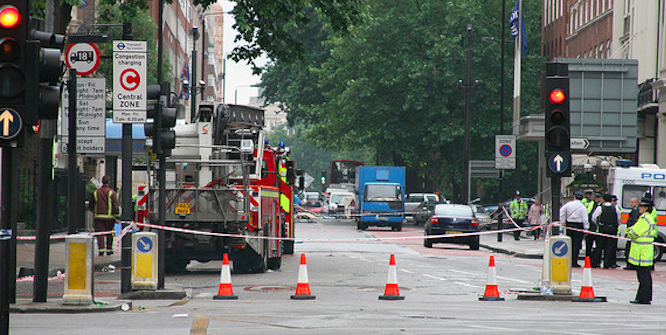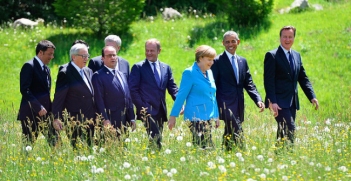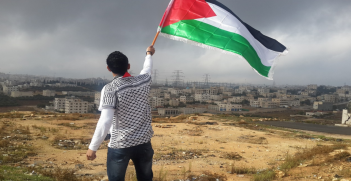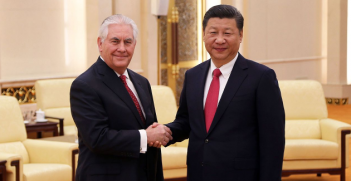The War on Terror: Lessons from the London Bombings

Dr Michael McKinley reflects on the London bombings ten years ago, and what, if anything, the West has learned from its “War on Terror” and its efforts at deradicalisation in this age of ISIS.
The first reflection that comes to mind is that the 11 September 2001 attacks in the United States that killed 2,996 and wounded over 6,000 have so seized the imagination that subsequent acts of a similar nature have been degraded, among them the bombings of 11 March 2004 in Madrid, and 7 July 2005 in London (56 killed, 700 wounded). Beyond the United Kingdom and Spain, respectively, they have lost the global currency still attached to 9/11 and are steadily declining into atrocities of merely local significance. This is not unusual; indeed, it was always to be expected. Other people’s misfortunes are simply that, and memory is always selective in the interests of, to use the execrable phrase now in common usage, “moving forward.” The future, however, in a genuine self-conscious and self-critical democracy, demands that citizens understand the imperative of Columbia University’s John Erskine that they have “the moral obligation to be intelligent,” and Robert Bellah’s, that “democracy means paying attention.”
In this light, it is essential to ask what has been forgotten, intentionally or otherwise, and what has been learned in the ten years since a group of just four young British Muslims, previously unknown to authorities until they carried out their attacks and acting independently of an al-Qaeda control some place abroad, committed the first ever suicide attack in the British Isles, and the deadliest bombing in London since the Second World War using home-made explosive devices and claiming to act in the name of their religion, as pronounced by the bomber, Mohammad Sidique Khan:
“I and thousands like me are forsaking everything for what we believe . . . . Our religion is Islam, obedience to the one true God and following the footsteps of the final prophet messenger. Your democratically-elected governments continuously perpetuate atrocities against my people all over the world. And your support of them makes you directly responsible, just as I am directly responsible for protecting and avenging my Muslim brothers and sisters. Until we feel security you will be our targets and until you stop the bombing, gassing, imprisonment and torture of my people we will not stop this fight. We are at war and I am a soldier”.
The immediate rush to commentary and counter-terrorism policy forgot, in the first instance, the historical detail that the world of nation states, empires, and even Civilisation itself has been, and remains, founded on blood sacrifice and violence, frequently of a terroristic nature and from other sources. As for London, this was history repeating itself: since the Gunpowder Plot of 1605, some 200 terrorist attacks have occurred in London, only four of which have been carried out by Islamists. None of this excuses what took place, but it needs to remain a caution when attempting to understand the context of what occurred.
As unrelieved as certain forms of amnesia seem to be in this area of inquiry, it is also the case that valuable understandings have been forthcoming which, if taken advantage of, will make positive contributions. Scholars, analysts, and researchers operating at the interface between the disciplines of political science, political sociology, forensic psychology, and social and religious anthropology, have demonstrated that sense can and is being made of autonomous homegrown suicide bombers in Western democracies. Foremost among their concerns is the need to empathise – to enter into the mind – of the terrorists, on the grounds that any successful counter to suicide terrorism must be predicated on a sound understanding of the enemy and the threat it poses.
In general they have found that, in the lexicon of the post-9/11 “terrorologists,” are called Third Generation Terrorists are essentially normal human beings: expressed negatively, they are neither suicidal in the psycho-pathological sense, nor insane or illogical in their tactical calculations. They are also not particularly well versed in the exegesis of their religion’s texts; indeed, as much as they may claim a religious sanction for their acts, there is nothing intrinsic in their religion which requires them to act as they do. Education, or the lack of it, gender, and socio-economic status are broadly irrelevant.
What motivates them is a grievance that can only be addressed by violence requiring their own death. Frequently, it is the occupation of, or attacks upon territory defined as a homeland by Western powers. The enemy is broadly defined – being all those, including Muslims, who are not actively engaged in the war against injustice.
What distinguishes them is that they tend to be drawn from communities of expatriates, or second-generation migrants, cut off from their cultural roots and thereby estranged from their surroundings. Some are converts to Islam who have the same disposition.
Though radical religious leaders might inspire them, they are not under their influence; rather, when they meet likeminded individuals, and spend more time with them, the formation of a small group is not only spontaneous but subsequently gives rise to a process of increasing radicalisation and a turning inwards, so that the focus is eventually exclusively on the group as a surrogate family at the expense of existing relationships based on blood and kinship. Context and group dynamics are paramount.
Finally, such a transformation is greatly facilitated by a process of mimetic engulfment within cultures where martyrdom is lauded. Such cultures might be religious but need not be,. To the extent that they are sources of ultimate meaning, and allow adherents to live creatively, they can authorise programmes for action in a tumultuous world.
Unsurprisingly, describing this form of terrorism is far easier than countering it. Currently, the formation of such groups is extremely difficult to observe – as evidenced by the fact that they first come to official attention as dangerous only after the event. Removing the grievance context is an equally fraught project. To the extent that many of the grievances are legitimate and involve historical betrayals of the Arab peoples, support for corrupt Middle Eastern regimes, and avoidable Western strategic catastrophes in Afghanistan, Iraq, and Palestine, the only current prospect is continuity. Even where there is an understanding of the need for change, the political will to do so is nonexistent. It is a form of stasis that implies a permanent, even acceptable level of threat and probable violence.
Given this political intransigence, the fact that real time intelligence is likely to be very demanding on resources, and the number of suicide bombers is a tiny fraction of the overall population from which they are drawn, counter-terrorism within Western countries has been remarkably successful since 2005. No events of similar magnitude to those in London and Madrid have occurred and it’s claimed that in countries including Australia, the United Kingdom and the United States, a total of more than 100 terrorist plots have been thwarted by competent, accurate and timely intelligence and policing. For all that, the situation remains reflective of the delicate balance of terror and security, which is summed up in the adage which holds that the security agencies and police forces must be effective (and lucky) all of the time, while the terrorists only have to be effective (and lucky) once.
Dr Michael McKinley is a Visiting Research Fellow at the College of Arts and Social Sciences at The Australian National University. This article can be republished with attribution under a Creative Commons Licence.





